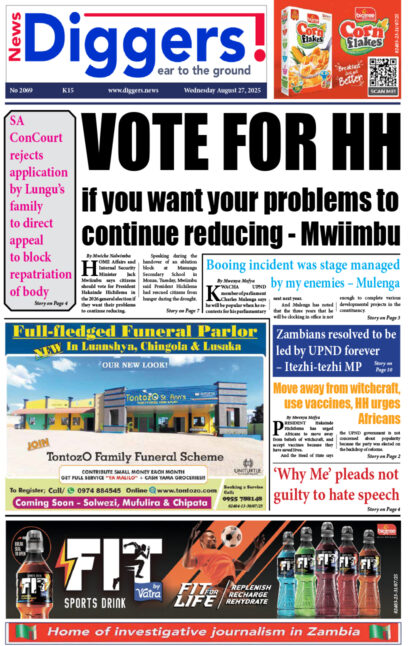THREE Civil Society Organisations say they will write to the Chief Justice to set up a Tribunal which will carry out an investigation in the event that any public official fails to fully comply with the Code of Conduct on declaration of assets and liabilities.
In a joint statement, Alliance for Community Action executive director Laura Miti stated on behalf of Chapter One Foundation and Transparency International Zambia that in the event that a Tribunal is convened and it finds that the public officials were in breach of the code of conduct, they may face criminal or administrative action.
“Full declaration of assets and liabilities is important for routine public finance accountability monitoring by civil society and the public. It both facilitates informed monitoring by the public and protects duty bearers from accusations of unlawful acquisition of assets they enter office with. It is in light of the above that, on Friday 8 th April 2022, we issued a letter of demand to the Attorney-General of the Republic of Zambia requesting that all public officials subject to the Code of Conduct comply fully with all the requirements of section 10 of the Parliamentary and Ministerial Code of Conduct within 14 days,” the statement read.
“In the event that any of the public officials fail to comply fully, we shall write to the Chief Justice to set up a Tribunal to investigate whether the officials in question are in breach of the code of conduct. If such a Tribunal is convened and it finds that the public officials are in breach, the public officials may face criminal and/or administrative action.”
The CSOs stated that not all public officials that were subject to the Code of Conduct have declared their assets.
They argued that in any event, declaring one’s assets was only partial compliance because one must also declare liabilities and sources of income.
“Alliance for Community Action, Chapter One Foundation, and Transparency International Zambia have a mandate that includes the pursuit of transparency and accountability in public resource management, to stem corruption, and to uphold and protect the rule of law, constitutionalism, and good governance. Pursuant to those objectives, we are concerned that most of the public officials that are required to adhere to the provisions of Section 10 of the Parliamentary and Ministerial Code of Conduct (“the Code of Conduct”) have failed to do so. Contrary to the position stated by the Director in the Ministry of Information and Media, Mr. Thabo Kawana, not all the public officials that are subject to the Code of Conduct have declared their assets. In any event, declaring one’s assets is only partial compliance. One must also declare liabilities and sources of income. If one does not declare all three of these, they are automatically in breach of the code of conduct,” read the statement.
“The reason it is so important to declare one’s liabilities and sources of income is so that the public can determine whether the public official in question has a conflict of interest, for example, in terms of any public procurement, to determine whether a public official is in debt or bankrupt, and also to ensure that the public official is earning their income from legitimate sources. All three of these requirements are in place to stop corruption and other abuses of public office. It is in the public’s interest to have full disclosure of the public official’s financial position throughout their stay in office.”
























